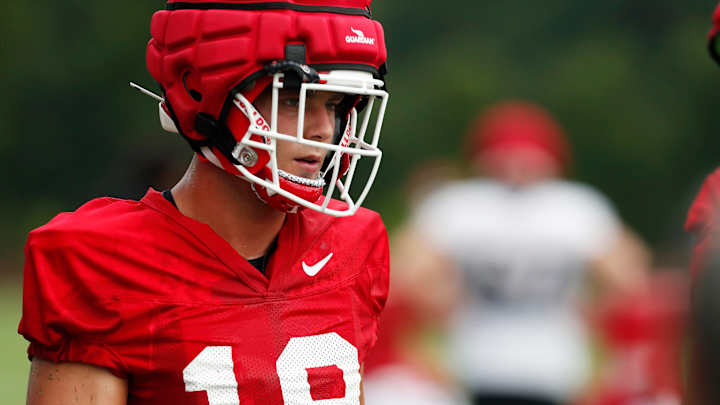Injuries At Running Back Could Cause Another Position To Lead In Total Offense

Georgia will be without running back Branson Robinson this season. The sophomore suffered a non-contact injury in practice with less than two weeks left before the season opener.
Veterans Kendall Milton and Daijun Edwards are good to go at this time, but Milton has battled the injury bug since last October. Behind them are several talented, yet inexperienced running backs. Most notable are Andrew Paul; who suffered a torn ACL last fall; and Roderick Robinson II; the best running back Georgia signed in the 2023 class.
Those concerns coupled with Georgia's high-powered passing attack place in jeopardy a certain streak most Georgia fans don't give a second thought to.
A running back has led the team in total offense every year since 2010
Georgia wears the "Running Back U" moniker proudly, so it's become an assumption that a running back would lead the team in total offense. That didn't change last year, even when Brock Bowers exceeded 1,000 total yards. Kenny McIntosh led the Bulldogs with 1,334 yards (829 rushing and 505 receiving).
While a running back has almost always led in this category, there have been a few exceptions. The most recent being 2009. A.J. Green caught 53 passes for 808 yards that year, besting running backs Washaun Ealey (740 yards) and Caleb King (702 yards).
It's worth noting that Ealey didn't debut until the middle of the LSU game five weeks into the season. Richt tore the redshirt off Ealey after a slow start to the season for Georgia's other backs. Those other backs combined for just 26 yards on 13 carries against the Tigers. Ealey gave the offense a much-needed jolt with 33 yards on eight carries in the second half. Though a controversial penalty against Green later in the game, caused the Bulldogs to fall short.
Meanwhile Green missed three games with an injury. He missed the entirety of the Idaho State blowout, recovering for a return against Auburn which didn't last long after aggravating said injury in the first half. Georgia played the rest of the regular season without Green.
Prior to 2009, Reggie Brown edged out Michael Cooper by a yard in 2003. Brown had a breakout season, stepping up when Fred Gibson and Ben Watson suffered injuries. He ended 2003 with 662 yards on 49 receptions, with an additional 69 yards on four carries.
Cooper stepped up in his own way, going from a virtual unknown at the beginning of the year. Musa Smith's departure left big shoes to fill and Georgia settled on a committee approach with Cooper taking the heaviest load; 156 carries for 673 yards, and seven catches for 57 yards.
On this topic, 2000 is by far the strangest season Georgia's ever experienced. Not one, not two, but three non-RBs led the Bulldogs in total offense. Terrence Edwards sat at the top of the chart with 725 yards, followed by fellow wide receiver Damien Gary with 552 yards (all receiving). Right behind them with 475 yards (all receiving) was tight end Randy McMichael.
The highest running back on the total offense list that season was Brett Millican who finished with 451 yards. Neither Jasper Sanks or Musa Smith reached 400 yards of offense in 2000.
2000 was merely the continuation of a trend in the 1990s for Georgia:
- Champ Bailey led Georgia's offense with 828 yards in 1998 while adding 3 interceptions and 210 kick return yards.
- Hines Ward, a former running back, paced Georgia with 1,070 yards from scrimmage. Oddly enough, this came a year after Ward passed for 872 yards as he helped at quarterback following Mike Bobo's injury.
- Juan Daniels's 726 receiving yards was the best output for Georgia's offense in 1995. Robert Edwards's injury against Tennessee that year caused the Bulldogs to rely on three other backs including Ward that season.
- Hason Graham (881 receiving yards) and Brice Hunter (799 receiving yards) led the 1994 Bulldogs, helping Eric Zeier put together his second 3,000-yard season. Terrell Davis, who led Georgia's offense in 1993, missed some time with injuries and was seldom at 100-percent when he did play. That injury-prone tag caused his draft stock to plummet, but he made it out okay.
Other Georgia News:
- Despite Injuries, Smart Bullish on Georgia's Running Backs
- Practice Observations - Georgia Priming for Second Scrimmage
- Preseason All-SEC Teams Released
Join the Community:
Follow Brooks Austin on Twitter: @BrooksAustinBA
Subscribe to our YouTube Page HERE.
You can follow us for future coverage by clicking "Follow" on the top right-hand corner of the page. Also, be sure to like us on Facebook @BulldogMaven & follow us on Twitter at @DawgsDailyFN
